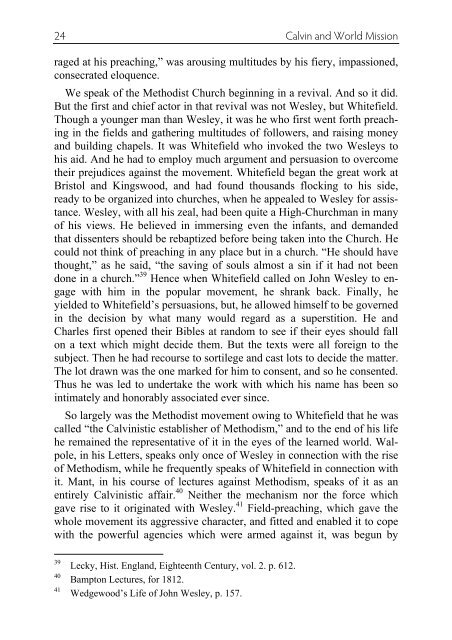Calvin and Missions - World Evangelical Alliance
Calvin and Missions - World Evangelical Alliance
Calvin and Missions - World Evangelical Alliance
You also want an ePaper? Increase the reach of your titles
YUMPU automatically turns print PDFs into web optimized ePapers that Google loves.
24 <strong>Calvin</strong> <strong>and</strong> <strong>World</strong> Mission<br />
raged at his preaching,” was arousing multitudes by his fiery, impassioned,<br />
consecrated eloquence.<br />
We speak of the Methodist Church beginning in a revival. And so it did.<br />
But the first <strong>and</strong> chief actor in that revival was not Wesley, but Whitefield.<br />
Though a younger man than Wesley, it was he who first went forth preaching<br />
in the fields <strong>and</strong> gathering multitudes of followers, <strong>and</strong> raising money<br />
<strong>and</strong> building chapels. It was Whitefield who invoked the two Wesleys to<br />
his aid. And he had to employ much argument <strong>and</strong> persuasion to overcome<br />
their prejudices against the movement. Whitefield began the great work at<br />
Bristol <strong>and</strong> Kingswood, <strong>and</strong> had found thous<strong>and</strong>s flocking to his side,<br />
ready to be organized into churches, when he appealed to Wesley for assistance.<br />
Wesley, with all his zeal, had been quite a High-Churchman in many<br />
of his views. He believed in immersing even the infants, <strong>and</strong> dem<strong>and</strong>ed<br />
that dissenters should be rebaptized before being taken into the Church. He<br />
could not think of preaching in any place but in a church. “He should have<br />
thought,” as he said, “the saving of souls almost a sin if it had not been<br />
done in a church.” 39 Hence when Whitefield called on John Wesley to engage<br />
with him in the popular movement, he shrank back. Finally, he<br />
yielded to Whitefield’s persuasions, but, he allowed himself to be governed<br />
in the decision by what many would regard as a superstition. He <strong>and</strong><br />
Charles first opened their Bibles at r<strong>and</strong>om to see if their eyes should fall<br />
on a text which might decide them. But the texts were all foreign to the<br />
subject. Then he had recourse to sortilege <strong>and</strong> cast lots to decide the matter.<br />
The lot drawn was the one marked for him to consent, <strong>and</strong> so he consented.<br />
Thus he was led to undertake the work with which his name has been so<br />
intimately <strong>and</strong> honorably associated ever since.<br />
So largely was the Methodist movement owing to Whitefield that he was<br />
called “the <strong>Calvin</strong>istic establisher of Methodism,” <strong>and</strong> to the end of his life<br />
he remained the representative of it in the eyes of the learned world. Walpole,<br />
in his Letters, speaks only once of Wesley in connection with the rise<br />
of Methodism, while he frequently speaks of Whitefield in connection with<br />
it. Mant, in his course of lectures against Methodism, speaks of it as an<br />
entirely <strong>Calvin</strong>istic affair. 40 Neither the mechanism nor the force which<br />
gave rise to it originated with Wesley. 41 Field-preaching, which gave the<br />
whole movement its aggressive character, <strong>and</strong> fitted <strong>and</strong> enabled it to cope<br />
with the powerful agencies which were armed against it, was begun by<br />
39<br />
Lecky, Hist. Engl<strong>and</strong>, Eighteenth Century, vol. 2. p. 612.<br />
40<br />
Bampton Lectures, for 1812.<br />
41<br />
Wedgewood’s Life of John Wesley, p. 157.

















